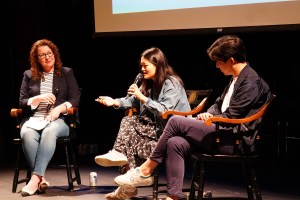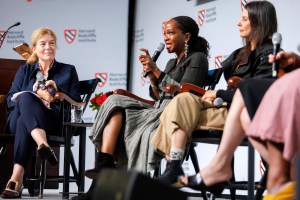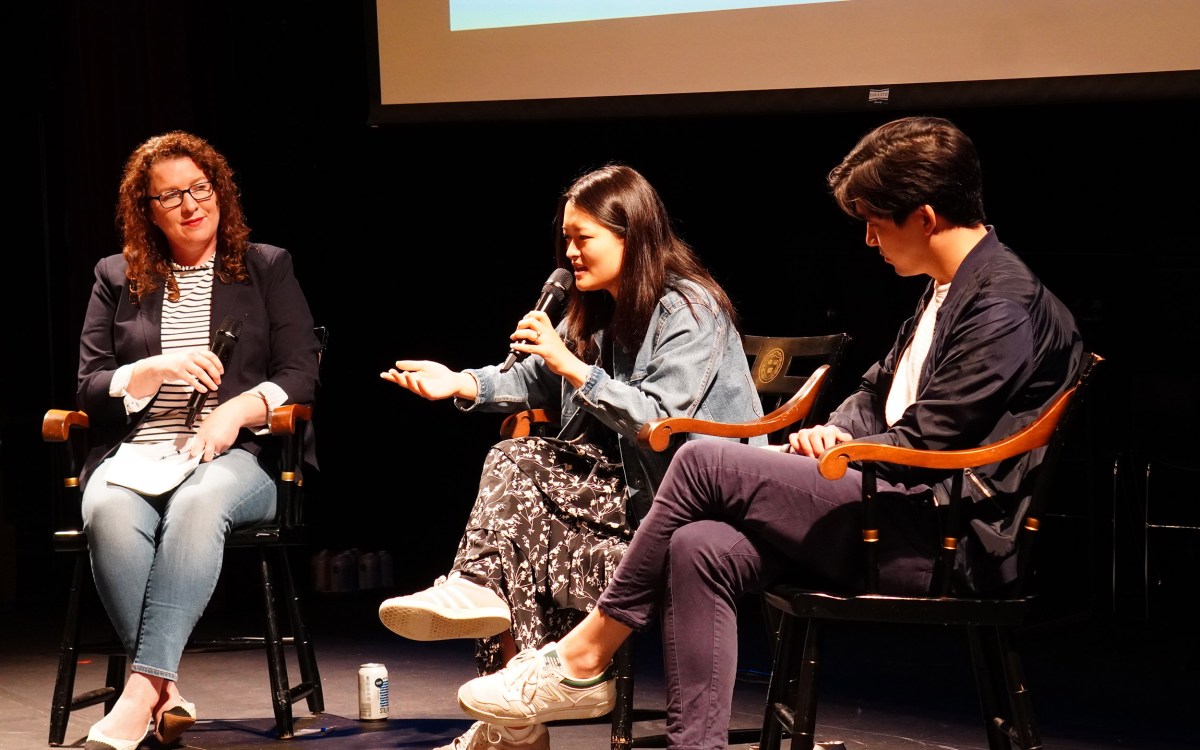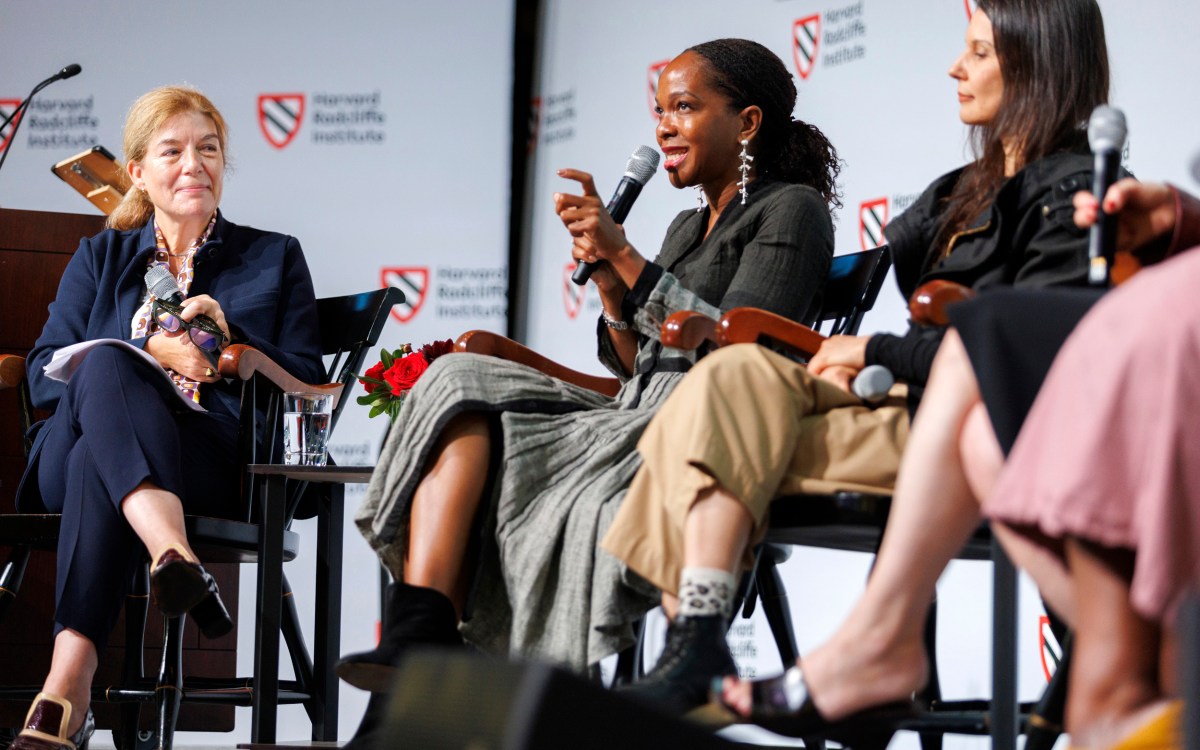Maestro Previn guides students with expertise, wit
In master class, composer, pianist puts two trios through their musical paces
Music great Sir André Previn’s motto, listed on his official Web site, reads, “A day without music is a wasted day.” Several Harvard students and two classical master composers put their day with the maestro to good use on Monday (Oct. 6).
Previn was in Boston to perform the world premiere of his short piece “Owls” with the Boston Symphony Orchestra, and was welcomed at Harvard where he conducted a master class organized by the Office for the Arts at Harvard, the Harvard Music Society of Kirkland House, and the Harvard Piano Society.
As part of the class, Previn listened to brief performances by two Harvard undergraduate trio groups, each consisting of a piano, violin, and cello, and then offered the players his insight.
Before the music began, the composer walked stiffly to his seat, just to the right of the giant fireplace in Kirkland House Junior Common Room. Hobbled by a severe attack of arthritis, Previn apologized to the audience for his slow motion. Later, after the first trio’s performance, he was unapologetic for his strong opinion of the Steinway piano he had just heard.
“It was so out of tune in the upper register it actually hurt,” he remarked, complaining that it affected the ability to play the instrument pianissimo, or very soft. “You can’t really play a pianissimo when the notes ping out that badly,” he added.
Previn was much more forgiving with the artists who performed for him. He reviewed their work, and like all great conductors, used his words not to scrutinize their mechanics or skill, but to help them connect to the music on a deeper level.
After listening to the first two movements of Beethoven’s Piano Trio in E-flat, Op. 70 No. 2 performed by the first group (who had been playing together for only a few weeks), Previn praised their effort and encouraged them to work on getting to know each other’s styles in order to better agree on the phrasing and shaping of the music.
“You have a slightly different conception of how to play a Beethoven trio, the three of you,” he said, noting the cellist Katie Austin’s ’09 “romantic outlook” and the strong vibrato from violinist Alex Shiozaki ’09.
“Just get a whole bunch of music and read it; just play one trio after the other; it doesn’t make any difference whether it’s any good or not or whether you make mistakes or not. … Just play together. Play a lot because then you begin to hear what each one of you is up to and what you sound like as an ensemble.”
He followed the next piece, the first movement of the Brahms Piano Trio in B, Op. 8, reading along from a large, weathered score in his lap. When finished, he asked the players to perform the opening few measures again, and took them slowly through several other measures in the piece, getting each of them to focus on the melody, the tempo, and the expression of the work.
“It was very different — a lot more passion in it; it wasn’t so careful,” he said after the group repeated the beginning of the movement. “The first time through, you tried to play everything absolutely on the button and it’s not necessary,” he said.
He urged the three to get a copy of the unrevised version of the piece and compare it with what they had played. According to Previn, Clara Schumann, an accomplished pianist, the wife of composer Robert Schumann, and a longtime friend and love of Brahms, didn’t like the original.
“She thought it was too passionate; it embarrassed her, seriously, and he wrote it again, much more to her liking,” said Previn, who again encouraged the players to experiment more with the work, and not heed so strictly to the written markings on the page.
“If you feel like it should go faster for a while, softer, louder, whatever, do it. It’s a wildly romantic piece. If you play it too close to the vest, it loses … . Go for it, go for it. … Don’t wait for the music that much.”
Previn fled Nazi Germany with his family in 1938 for Paris, and settled shortly after in Los Angeles. As a young man and piano prodigy, he worked composing film scores at MGM. Later he held conducting posts with several orchestras, including the Houston Symphony, the London Symphony Orchestra, and the Royal Philharmonic. Some of his key compositions include the opera “A Streetcar Named Desire” and his Violin Concerto (“Anne-Sophie”) written for his ex-wife, famed violinist Anne-Sophie Mutter. He is also a noted jazz pianist.
With humorous anecdotes, Previn recounted much of his own career and the varied musical lessons that shaped him as an artist. Any opportunity to play or conduct or compose, he said, no matter how small, was important.
One memorable moment came while he was improvising the background piano music at a silent movie theater. During one film, he played a “maniacal ‘Tiger Rag’” to accompany a Roaring ’20s scene on the screen. Later he saw the manager charging down the aisle in a state “beyond fury.” Not bothering to look back at the screen, Previn hadn’t noticed that the action had switched to biblical times.
“I was playing ‘Tiger Rag’ during the crucifixion. … Even that taught me something; … [any musical experience] helps, anything,” he said.
His experience in Hollywood composing music for films also taught him much. While the music wasn’t always of the highest quality, the musicians he worked with were, noted the composer, and his music was played almost immediately after it was written.
“We didn’t know if the music was going to be second-rate, third-rate, or 10th-rate, but it was going to be played, and if you sit there as a relative beginner, … [you] say, ‘Well, I like that. I’m going to do that again,’… or, ‘That didn’t work at all; I’m never going to do that again’… If you hear it, it stays in your head and you register it.”
One of Previn’s greatest lessons as a conductor concerned trusting the orchestra, and came from an early instructor. The man attended a performance Previn conducted and afterwards asked him if he thought the orchestra had played well. When Previn answered, ‘Yes,’ his teacher responded, “So did I. Next time, don’t interfere.”
The teacher’s other great advice, said Previn, was the notion that it’s easy to make an orchestra play, but “difficult to make them want to.”
Previn, almost 80, has amassed a trail of honors and accomplishments during his long career including four Academy Awards, five Grammys, a Kennedy Center Lifetime Achievement Award, and a knighthood, to name a few. He is honest and up front and ready to admit that he has written many things he’d just as soon forget. But there are many pieces that he likes, too. And a life surrounded by music, he told the crowd gathered at Harvard, has been a rewarding one.
“I would hate to say I am a conductor, full stop; I am a pianist, full stop; I am a composer, full stop. But one thing I know is that I am a musician, and that is the best cloak in the world. I can’t think of anything I’d rather do than be a musician.”
Nico Olarte-Hayes ’11, the cellist who performed with the Brahms trio, was honored to play for the music legend.
“He’s done everything,” Olarte-Hayes said. “It’s great to learn from the best.”



